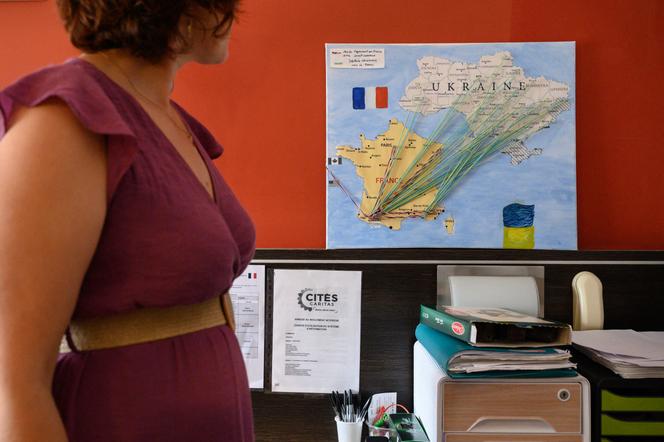


More than 25,000 Ukrainians applied for asylum in Europe in 2024. Over half of them did so in France, even though it is ranked 9th among European countries who have been welcoming Ukrainians since the war began in 2022. This unusual situation explains why, on Wednesday, May 14, the Sénat, which is dominated by the right, took a bipartisan stance in favoring a bill by Nadia Sollogoub, a right-wing independent senator. The goal: To curb a rise in asylum requests by Ukrainians, by improving the temporary protection status they benefit from. Senators adopted the bill with 343 votes for and 1 abstention.
Temporary protection is an exceptional status stemming from a 2021 European directive, which was activated for the first time shortly after Russia invaded Ukraine, in March 2022. This measure allowed Ukrainians to settle wherever they wished in Europe and benefit from temporary residence permits, enabling them to work, be housed, receive a subsistence allowance, and have healthcare coverage. In France, they can also receive welfare benefits for family and housing assistance. Europe stood out for its quick response and the consensus that prevailed among its member states in addressing the situation.
So why, three years later, are Ukrainians who have settled in France "massively" turning to asylum, as Sollogoub said in a public Sénat session? The country recorded more than 12,000 asylum applications in 2024, and around 5,000 since the start of 2025. Over 90% of these applications were accepted.
"This shift towards asylum applications is mainly due to the insufficient social benefits associated with the temporary protection" status, the Sénat's law commission wrote in its report on the subject. On Wednesday, the bill's rapporteur, Isabelle Florennes, a centrist senator, mentioned other factors that explain the change: Ukrainians must renew their temporary residence permits every six months at the local prefecture, a tedious and time-consuming process, while asylum grants a permanent residence permit; moreover, uncertainty looms over the potential end of the European temporary protection mechanism in March 2026; and, finally, applying for asylum can be a way to access housing facilities reserved for asylum seekers, in the event of difficulties finding accomodation.
"The mechanism is not adapted to the long term (...) and must be adjusted," said Sollogoub on Wednesday. Therefore, the bill that was voted on plans to open up several types of benefits to Ukrainians: one for disabled adults, a solidarity allowance for the elderly, and a personalized autonomy allowance, which is also aimed at people over 60.
The government supported the bill. Junior Interior Minister François-Noël Buffet, praised the bill, saying it "aims right (...) to support our Ukrainian friends." This support could be explained by a desire to not encourage Ukrainians to settle in France over the long-term. "They must be able to return to their country," said Sollogoub. However, refugee status anchors their stay to a longer time period and does not allow them to return, even temporarily, to their home country. "It also poses a diplomatic problem," added a source at the interior ministry, who spoke anonymously, adding: "Ukraine does not want its nationals to seek asylum."
While the bill improves the current temporary protection mechanism, it does not change the length of the temporary residence permit (renewed every six months, compared to one year in Germany), which the interior ministry does not wish to revisit. Similarly, the right to access a welfare benefit for unemployed people was excluded from the new status, though the initial draft of the bill and amendments (all rejected) had included this. "This goes against the bill's objective," said Guy Benarroche, a Greens party senator. The bill must now be scheduled for debate in the Assemblée Nationale.
Translation of an original article published in French on lemonde.fr; the publisher may only be liable for the French version.
